Even though the Bernedoodle Poodle mix isn’t as popular as its Labradoodle and Goldendoodle friends, it certainly has its own charm.
You’re now here because you have gone through the fun but tiring process of finding the best Bernedoodle breeder, buying the perfect Doodle friend, and tracking down everything you need in order to set up this new fuzzball!
But, now that your Bernedoodle is growing, you’re asking yourself, how big will my Bernedoodle get? What should you even expect with a dog that is a mix of a Bernese Mountain Dog and a Poodle?
One thing is certain: your pup will be large! But, how large, you might ask? With all the hassle of having a mixed breed, that will depend on the kind of Bernedoodle you have!
There are many things that might influence your Bernedoodle puppy’s growth, and all dog breeds are different! However, one thing is certain: this can either be a giant breed or a smaller breed depending on the kind of Bernedoodle you have.
Don’t worry, soldier! We have prepared a Bernedoodle growth chart just for you, and we will engage in all of the whats and hows in question when it comes to what factors play into your Bernedoodle’s growth!
Buckle up! We’re in for a ride!
Bernedoodle Growth Chart — An Overview
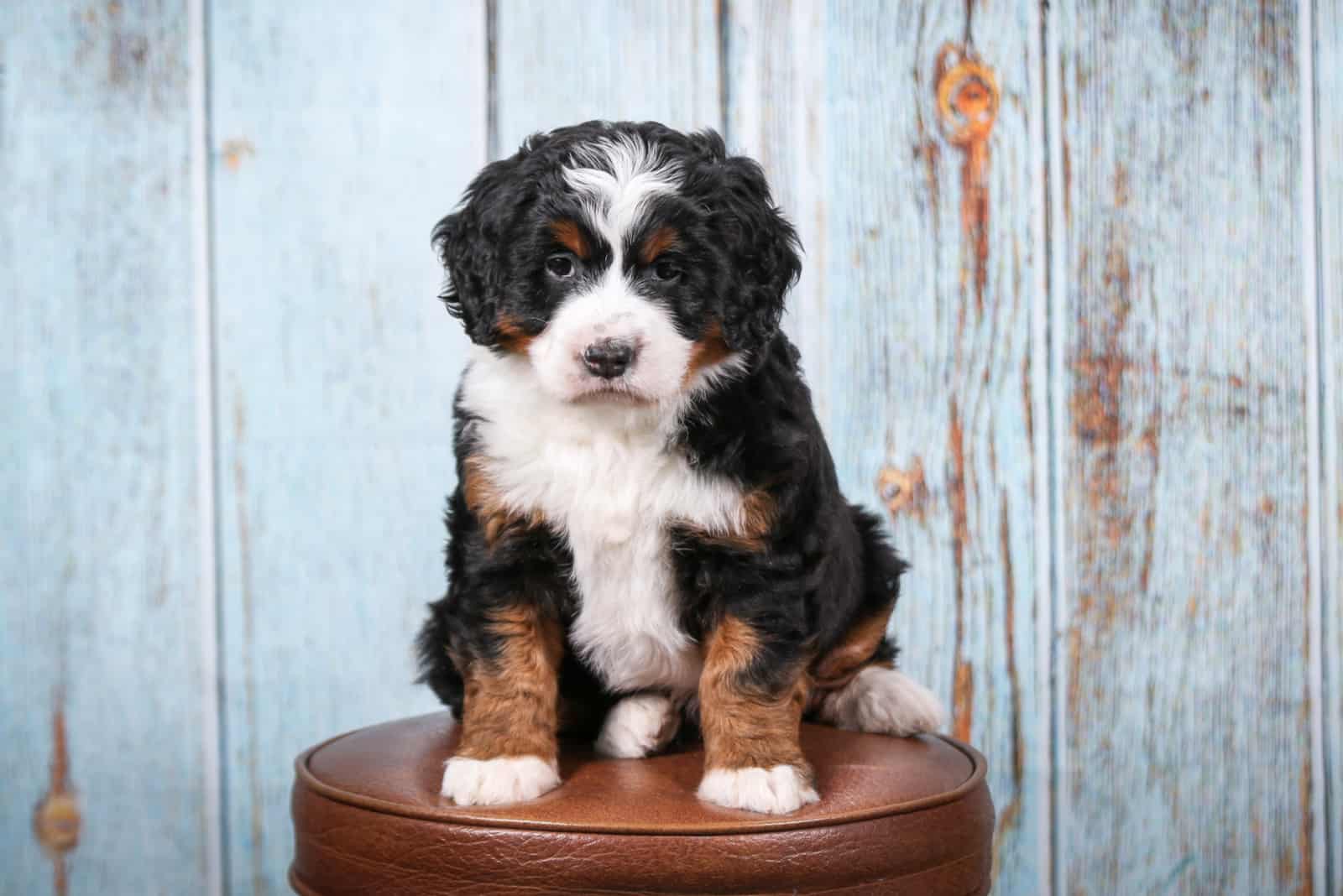
One of the factors that influence your puppy’s growth is the type of Bernedoodle you have. You might have a Mini Bernedoodle or (Toy Bernedoodle), a Medium Bernedoodle, or a Standard Bernedoodle.
Here is an overview of what to expect with each type of Bernedoodle, from puppyhood to adult weight.
| Age | Mini | Medium | Standard |
|---|---|---|---|
| 1 month | 6 lbs | 11 lbs | 14 lbs |
| 2 months | 10 lbs | 18 lbs | 24 lbs |
| 3 months | 14 lbs | 25 lbs | 33 lbs |
| 4 months | 18 lbs | 33 lbs | 42 lbs |
| 5 months | 20 lbs | 36 lbs | 46 lbs |
| 6 months | 22 lbs | 40 lbs | 52 lbs |
| 7 months | 24 lbs | 43 lbs | 55 lbs |
| 8 months | 26 lbs | 46 lbs | 59 lbs |
| 9 months | 27 lbs | 48 lbs | 62 lbs |
| 10 months | 28 lbs | 50 lbs | 64 lbs |
| 11 months | 29 lbs | 51 lbs | 65 lbs |
| 12 months | 29 lbs | 52 lbs | 66 lbs |
| 18 months | 30 lbs | 53 lbs | 67 lbs |
When using this Bernedoodle weight chart, make sure you look at the month of age your Bernedoodle is and drag to the appropriate type of Bernedoodle to find your puppy’s ideal weight!
However, don’t immediately panic if your Doodle isn’t the exact dog size in this chart as there are so many factors that influence your pup’s weight, and not all of them are bad!
Bernedoodle Growth Chart In Detail
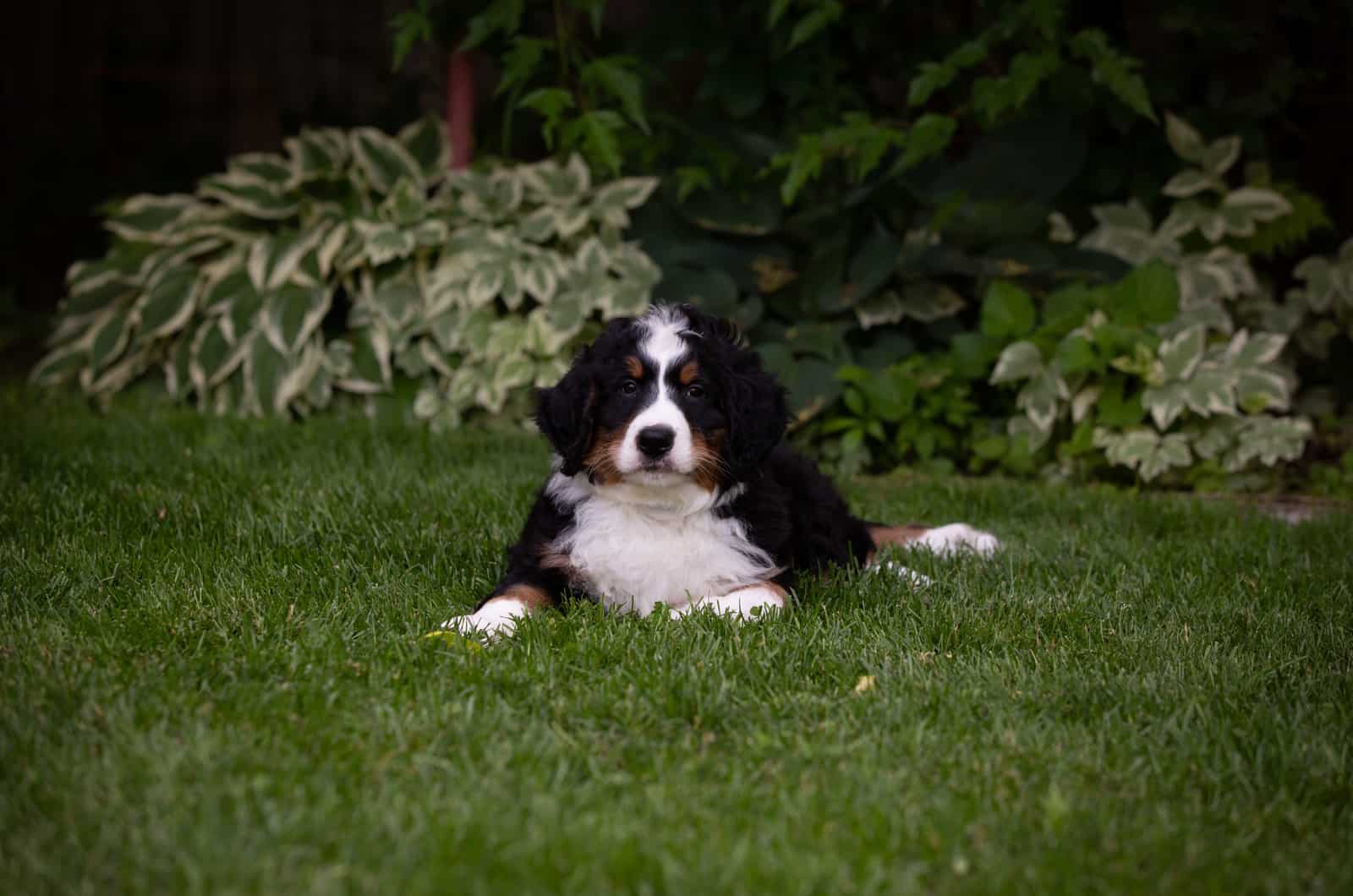
If this Bernedoodle growth chart isn’t enough and you want to learn more about your puppy’s weight and what to expect at each week/month mark, read on!
0 – 2 Weeks Of Age
If you are a Bernedoodle breeder or you simply have Bernedoodle puppies of your own, lucky you!
We know that the growth rate of your Doodle will depend on the type of Bernedoodle you have, but most newborns will weigh approximately one pound when they are born, and will probably weigh about two pounds by the end of the first week of age.
You can’t expect much with puppies this age as they are entirely reliant on their mother for all the food and warmth that they need.
Your only job as a dog owner is to make sure that Momma is feeding all of her puppies.
Sometimes, it can happen that a mother rejects one of her puppies. In that unfortunate scenario, you have to think about a puppy milk formula and feeding it on a schedule.
3 Weeks – 12 Weeks Of Age
Your puppy will have a huge growth spurt during this time period. Even though they still rely on their mom for many things, that won’t stop them from getting into some adorable puppy mayhem of their own!
By the end of this time period, your Bernedoodle puppy should weigh approximately 35 pounds. In addition to that, it should not have to rely on its mother at this point in terms of nourishment, and should begin eating puppy food.
4 Months – 6 Months Of Age
Even though your Bernedoodle puppy’s growth rate has started slowly decreasing, that doesn’t mean its appetite will do the same. It’ll still eat like a bear!
You have to make sure you are feeding your pup regularly so that it can grow into a healthy Bernedoodle dog.
Puppies at this age burn a lot of calories by getting into puppy mischief, so you have to make sure that it is getting all the nourishment it needs in order to grow.
7 Months – 9 Months Of Age
During this time period, you will testify to the fact of how big Bernedoodle puppies become. This truly is a large dog breed!
By the end of the ninth-month mark, your dog will weigh approximately sixty pounds, and it will still keep on growing (sometimes even until it is two years of age)!
Even though the growth rate will have slowed down, you still need to make sure you are feeding your dog well in order to ensure it is getting the proper nutrition for healthy development.
10 Months – 12 Months Of Age
You can expect your pup to still be growing between this time period, even though it will have slowed down extensively. However, when it comes to weight, you can expect your pup to have gained quite a bit.
Your puppy should already be around sixty-five to seventy pounds by the end of this time period. However, you shouldn’t expect this to be its final weight because these pups continue to develop even after their first year.
When Is A Bernedoodle Fully Grown?
Ah, adulthood! Now, you can rest from all that puppy mayhem (even though it was rather cute).
When your pup reaches adulthood, it should stop developing. However, you might notice that Bernedoodles take their sweet time reaching adulthood when compared to other dog breeds.
You shouldn’t be surprised if your Bernedoodle continues growing until it reaches two years of age! Imagine — a puppy for two years!
This is the time mark when they will have attained their adult weight and height.
You will notice that your Doodle will complete its height-wise growth before it stops gaining weight, so don’t be worried if you notice that your puppy is still gaining extra pounds after its first year of age!
How Big Do Bernedoodles Get? Factors That Affect Growth
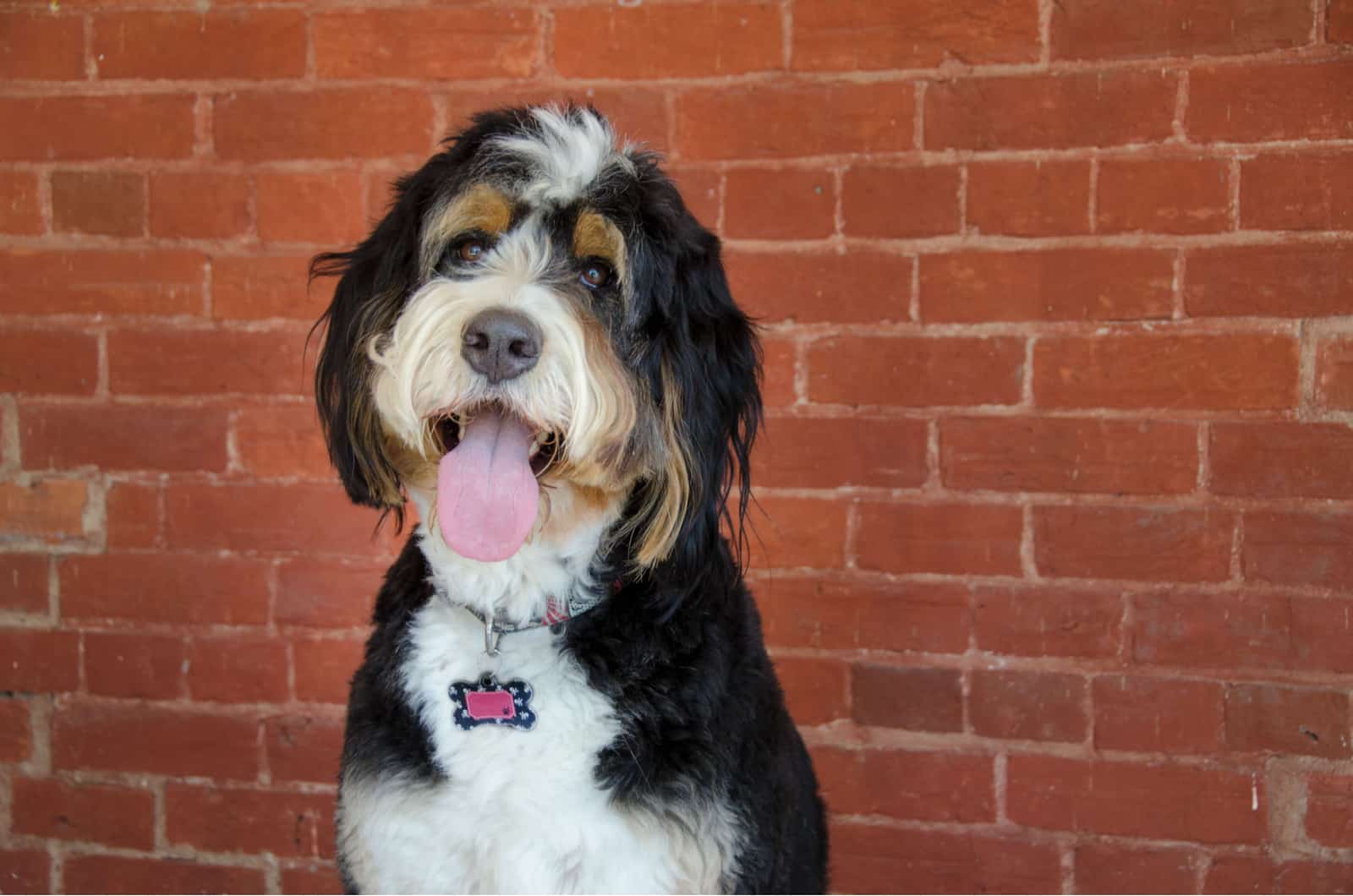
There are four factors that affect how quickly (or slowly) your Bernedoodle will grow: type of Bernedoodle, generation of Bernedoodle, nutrition, and physical health. We will discuss all of these factors in detail below!
1. Genetics: Type Of Bernedoodle.
It shouldn’t come as a surprise that genetics is probably the most important factor that influences how much your puppy will grow.
If you can recall, there are three different kinds of Bernedoodles, and the type of Bernedoodle you have is the largest indication of how large your puppy will become.
The issue with the type of Bernedoodle is that they can be mixed with your Standard Poodle, a Toy Poodle, or even an Aussiedoodle – all of which have different sizes that determine the growth of their offspring.
Because the Bernedoodle is a mixed breed, it makes it even harder to figure out how large your dog will be, especially because you don’t really know the percentage of Poodle and Bernese Mountain Dog your Bernedoodle is going to be without a genetic test.
Let’s break down each type of Bernedoodle to figure out what its approximate weight will be.
Mini Bernedoodle (Toy Bernedoodle)
Minis are the cutest among the Bernedoodle family, being the smallest of the three types and having been a crossbreed between a Miniature Poodle and a Bernese Mountain Dog.
At eight weeks of age, you will find that your Mini Bernedoodle puppy will weigh around ten pounds, which is not radically different from the other Doodle types, but you will notice a drastic difference after the first eight weeks.
When your tiny Bernedoodle is about twenty weeks of age, it will weigh approximately twenty pounds, and afterwards, you will notice that its weight doesn’t change much.
It will reach its full size at around forty-four weeks of age, even though its weight might fluctuate, but not dramatically.
If you measure this small dog, you will find that its adult height is around twelve to seventeen inches, and its weight is about twenty-four pounds, if fed appropriately. Of course, one is always faced with the unfortunate reality of obese dogs.
Medium Bernedoodle
Medium Bernedoodles are larger dogs when compared to the adorable Minis, and their maximum height lies somewhere between eighteen and twenty-two inches when they reach adulthood. You can measure this height from the shoulders to the feet.
Their maximum healthy weight will be around twenty-four and forty-nine pounds.
If you pay attention to the Bernedoodle growth chart, you will notice that Mediums will weigh approximately eighteen pounds at eight weeks of age, and bounce up to thirty-six pounds by week twenty! A whopping difference!
Your Medium will achieve its adult size at about a year of age, which means that they attain their final size when it comes to weight and height sooner than the Standard Bernedoodle.
However, you should not be worried if your Medium does not hit these weights and heights because there is considerable variation in this breed. As long as your dog is following its natural growth curve, it should be fine.
Standard Bernedoodle
The Standard Bernedoodle is the largest of the types of Bernedoodle out there, and they grow until they are two years old.
A Standard can weigh up to twenty-four pounds by the time it is eight weeks old, and it will grow very rapidly, attaining forty-six pounds by the twentieth week of age.
The maximum height of your Standard is approximately between twenty-three and twenty-nine inches when measured from the shoulder to the feet.
Its weight in adulthood should lie somewhere between seventy and ninety pounds — however, don’t be panicked if this isn’t the case with your Standard. Remember, since this is a mixed dog breed, it can be difficult to tell how large each type should be.
2. Genetics: Generation Of Bernedoodle.
If you thought that the whole type of Bernedoodle was a bit overwhelming, then let’s talk a little bit more about other genetic factors that might influence your dog’s weight and size.
There are three types of Bernedoodles when we are talking about Bernedoodle generations that affect dog size: the F1B Bernedoodle, the F1 Bernedoodle, and the Australian Bernedoodle.
The generation of Bernedoodle is important because it determines the percentage of dog breed that is in your mixed Bernedoodle breed, and this can heavily affect how large your dog will become.
Let’s briefly go over each type!
F1 Bernedoodles
The first type we will go over is the F1 Bernedoodle, which is a breed of Bernedoodle that is fifty percent Poodle and fifty percent Bernese Mountain Dog. This is usually what people think about when they hear about the Bernedoodle.
An F1 Doodle will reach its full height at twelve to fourteen months of age. However, it takes them much longer to reach their adult weight, which will be at approximately two and a half years of age.
This means that it takes them much more time to develop when compared to other dogs.
F1B Bernedoodles
Some dog owners will swear that their F1B Bernedoodles are the best — but that just might be because they are more Poodle than Bernese Mountain Dog! Seventy-five percent of its genes will be Poodle, whereas only twenty-five percent will be Bernese Mountain Dog.
F1B Bernedoodles reach their full height when they are a year old, and attain their final weight between the eighteenth- and twentieth-month mark.
Australian Bernedoodle
This is probably the most exotic of the Bernedoodle generation types since it is a mix of Poodle, Bernese Mountain Dog, and Aussiedoodle, making it much more difficult to tell what your dog will end up weighing by adulthood, considering this mix.
However, we can give some approximates. Usually, the Australian Bernedoodle will have reached its maximum height by the time it is a year old, and its final weight by the time it is two.
3. Nutrition.
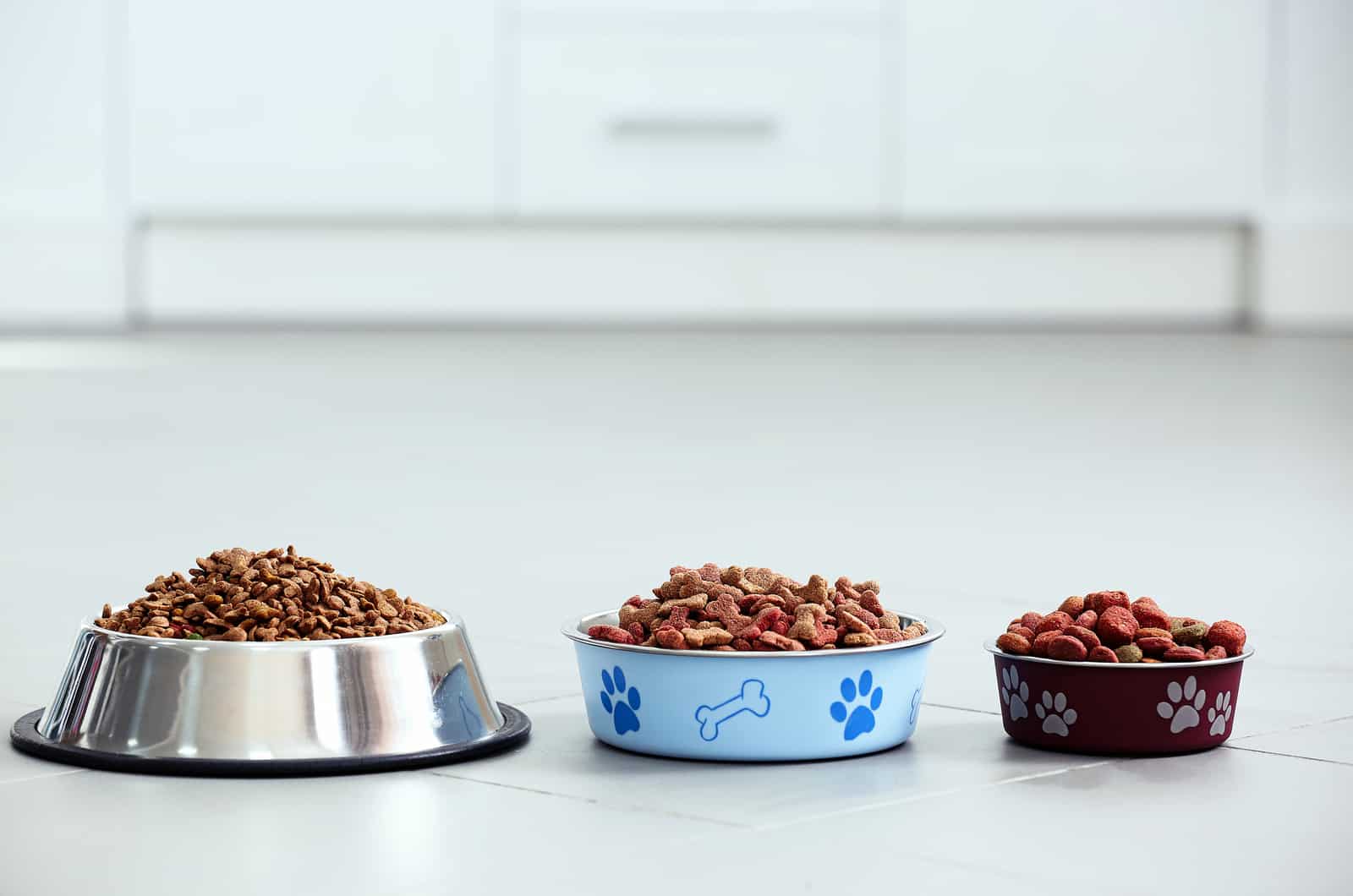
It shouldn’t come as a surprise that how and what you feed your dog will affect your dog’s growth rate.
Nutrition probably isn’t as important of a factor as genetics, but if your dog suffers from poor nutrition or malnutrition, it probably won’t be getting all of the nutrients it needs to develop to its maximum capacity.
Even though nutrition will most likely not affect how quickly your dog will grow, or affect your dog attaining a height or weight that is not set in its genetic code, it can affect your dog negatively if you serve your dog a poor diet.
Let’s say you give Kujo bad dog food, or perhaps you don’t give him all the nutrients he needs in order to grow. Chances are he will suffer from a joint dysfunction and other diseases later on in his life.
You probably won’t even have to wait until adulthood to see the damage that poor nutrition will have on your dog. If your dog isn’t getting enough nutrients, it will affect his brain, which will consequently not be able to give the dog’s body commands to develop properly.
That is why it is important that you regularly feed your dog healthy, nutritious dog food, which is filler-free and does not contain any harmful chemicals that your dog’s body will not appreciate.
You also should talk to a vet about possible supplementation, and whether your dog needs it at all in order to grow at a better rate. We would not recommend giving your dog any additional supplements without consulting a vet first.
4. Physical Health.
Physical health is very important when it comes to how healthy your Bernedoodle will be.
You might not think at first that physical exercise and health may affect your dog’s growth, but this is far from the truth, especially considering how physical exercise helps your dog’s bodily functions work and develop.
Younger pups don’t need to be encouraged to exercise as much as parent dogs because they mostly work themselves out to exhaustion by getting into their puppy mischief.
After they run themselves down, they will require lots of rest in order to recover from all of that exercise achieved through play.
However, as your Bernedoodle grows, you will realize that it will require more than its puppy drive to keep it healthy. Walks and goal-oriented games are a great way to ensure that your puppy is developing in a healthy manner.
What If My Bernedoodle Is Not The Correct Weight?
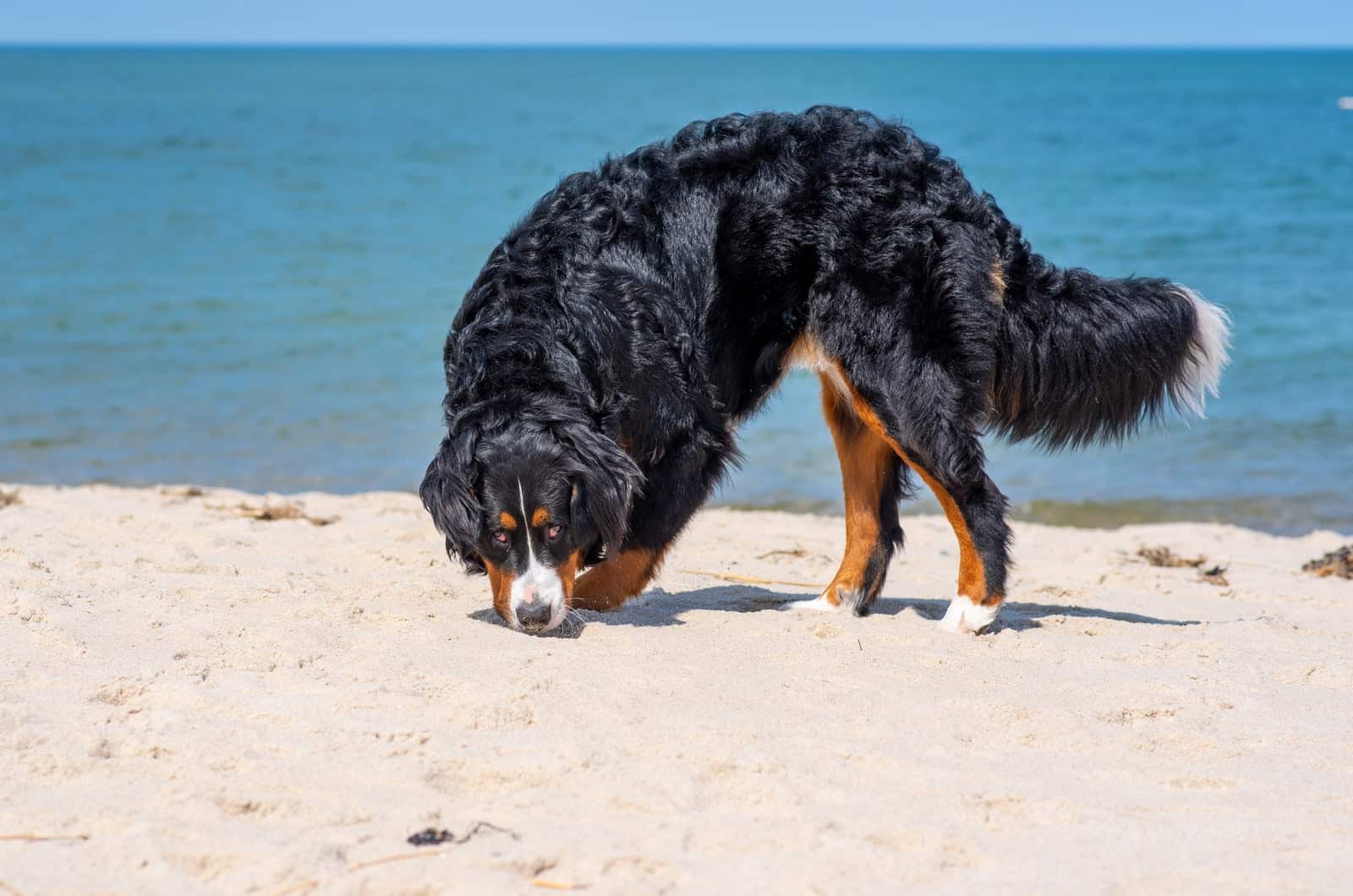
If your dog doesn’t fit in the weight ranges described below, especially if you feel like it has attained its full weight and height, you might start to worry.
You might be wondering if the Bernedoodle growth chart we have prepared indirectly indicates that your dog is suffering in some way unknown to you.
However, we are here to tell you that it is very common that puppies don’t fit the Bernedoodle growth chart entirely.
Growth charts generally are created based on averages in dog populations, and not every single dog will be the average fit. Your dog might be a healthy outlier!
Another reason why your dog might not fit the Bernedoodle growth chart we have created is because Bernedoodles are a mixed breed, which means that there is a lot of variety in their genetic makeup.
The only true way to know how big your dog will be is to examine its genetics through a DNA test, but you don’t necessarily have to do that if your vet assures you that your dog is healthy.
What is important in terms of health is that you can see your Bernedoodle’s waist and feel its ribs. You should make sure that your dog isn’t becoming obese nor too thin.
If you are still concerned that your dog isn’t following the growth chart, you can always ask your vet for more information or if there is a need to rule out any diseases.
What Are Common Bernedoodle Health Problems?
 Usually, every breed has certain diseases or genetics that might affect the dog’s development or how it is growing, so it is always wise to know everything you can about the dog breed you own.
Usually, every breed has certain diseases or genetics that might affect the dog’s development or how it is growing, so it is always wise to know everything you can about the dog breed you own.
You’re in luck if you have a Bernedoodle because mixed breeds generally tend to have less health-related issues that will affect their growth.
However, there is a slight chance that Bernedoodles might still develop conditions such as hip dysplasia, elbow dysplasia, allergies, eyes issues, or skin eyes.
The good thing about these health-related problems (ironically) is that they shouldn’t affect your dog’s lifespan or growth to a significant extent, so there is not much to worry about. At the end of the day, you can always ask your doctor for more advice.
What Is The Lifespan Of A Bernedoodle?

You might be wondering if the lifespan set in the genetics of your Bernedoodle affects how it will grow.
The truth is that as long as your Bernedoodle is not suffering from any genetic illness, you shouldn’t be too worried about its lifespan as that is affected primarily by your Bernedoodle’s genetics and not its natural growth.
You still might be wondering how long your Bernedoodle will live, especially if your pup has already reached adulthood.
In that case, you should know that smaller Bernedoodles tend to have a longer lifespan when compared to their larger family members.
You can expect an F1 Bernedoodle to live for about twelve years, whereas a Mini might live up to eighteen years of age.
If we don’t factor in any unexpected illness, we can say that your dog might live anywhere between twelve and eighteen years of age.
Just make sure that you take care of your pup throughout its life by feeding it a good diet, taking it to the vet, and maintaining a good exercise routine. This will help your dog’s life expectancy in the long run.
Conclusion: Bernedoodle Growth Chart
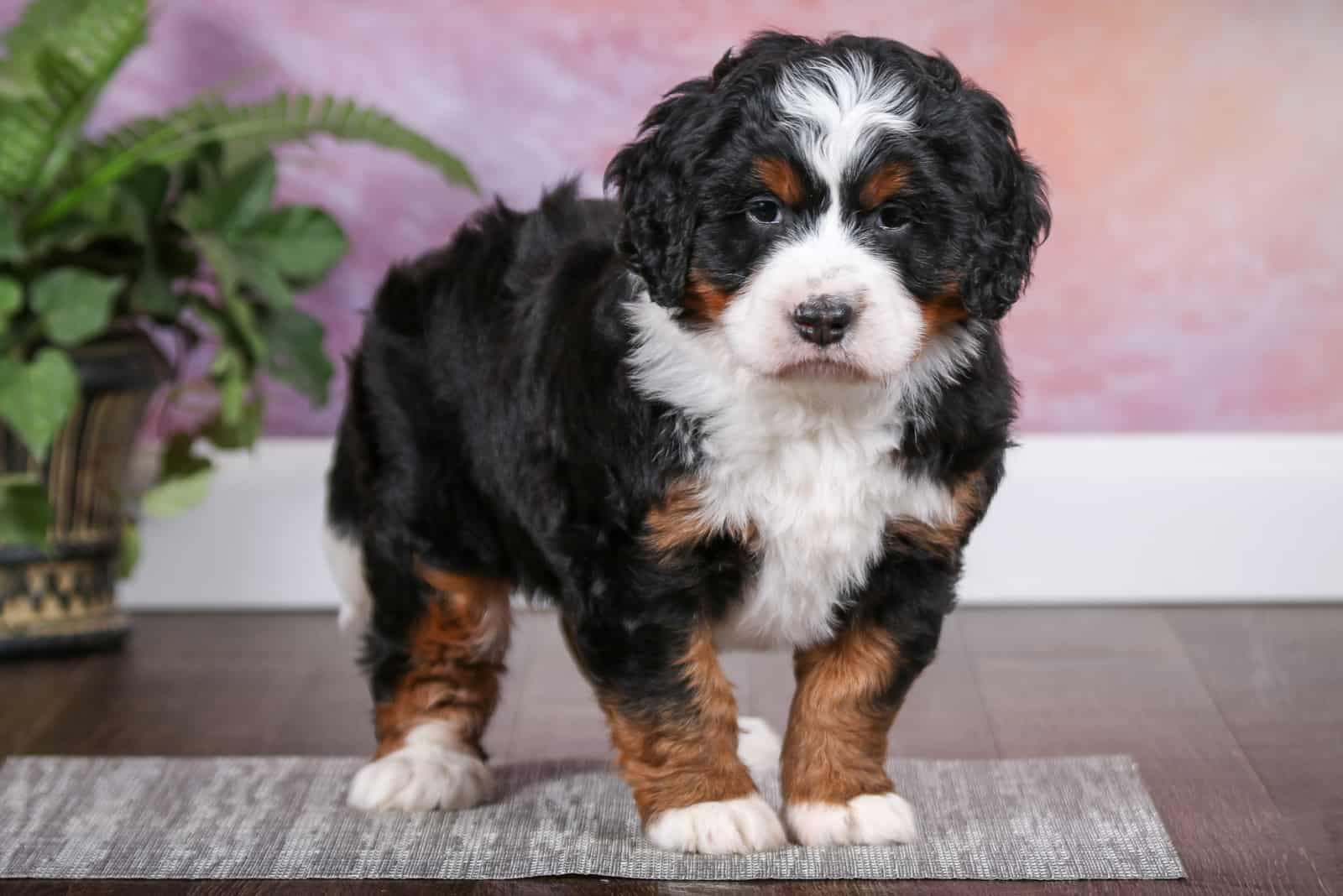
We truly hope that we have helped you answer all of your Bernedoodle questions related to growth, and that this Bernedoodle growth chart was of use to you.
We know it can be difficult to figure out certain stages in the process of your Bernedoodle developing from a puppy to a fully grown adult.
We hope that this puppy growth chart as well as the puppy weight calculator approximations have helped you figure out how large your Bernedoodle should be.
We still know it might be difficult to figure out proper weight and height with a mixed breed that isn’t like other purebred dogs like a Chihuahua or a Golden Retriever, but we assure you that as long as your pup is following its growth curve, it should be fine!
Just make sure that you are up to date with everything that ensures healthy puppy development like proper diet and good health care.
You can always ask your vet for more information if you have any additional questions related to your unique Bernedoodle pup!
